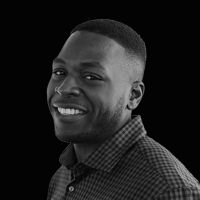Hello. My name is …
By Ifeolu Adeyemi
15 October 2020

… Ifeolu Adeyemi. I come from Nigeria, a part of the world where the name of a child expresses the parents’ expectations or circumstances surrounding their birth. The meaning of my first name is God’s Love / The Love of God (Ife meaning Love and Olu meaning God) and my surname means the Crown Fits Me (Ade meaning Crown and Yemi meaning it Befits Me).
Most people would agree that names matter. To say the least, they serve as important identifiers. We introduce ourselves with them. Sometimes, people change their names in order for them to align with their identity. As a result of their importance, pronunciations of names should matter regardless of how difficult it may be. For a lot of my life, I did not like my name. I would get nervous in school as the teacher was reading out the names on the register, anticipating a mispronunciation of my name. The children with more traditional names would butcher and tease my name unmercifully.
Like many professionals with a “unique” name, it has posed some career challenges. It has taken a long time to develop an honest love for my name and the meaning of it, but it has been worth the effort. The suggestion that an ethnic, cultural, or otherwise “unusual” name should be avoided to appease English speakers made me uneasy. I am aware that job discrimination is a real problem that causes many people to “whitewash” their CVs and adopt pseudonyms. The idea that people of colour and immigrants 'must' assimilate for others' comfort is not a safe feeling to have, and yet it is a feeling felt by most.
During a speech given by Uzo Aduba (a star on the show “Orange is the New Black”), she described a conversation with her mother about how she wanted to change her name as a child:
“My family is from Nigeria, and my full name is Uzoamaka, which means “The road is good.” Quick lesson: My tribe is Igbo, and you name your kid something that tells your history and hopefully predicts your future. So anyway, in grade school, because my last name started with an A, I was the first in roll call, and nobody ever knew how to pronounce it.
So I went home and asked my mother if I could be called Zoe. I remember she was cooking, and in her Nigerian accent she said, “Why?” I said, “Nobody can pronounce it.” Without missing a beat, she said, “If they can learn to say Tchaikovsky and Michelangelo and Dostoyevsky, they can learn to say Uzoamaka.”
My name is My Identity, My Legacy, My Personality and My Uniqueness. I feel incredibly empowered by it. I would want to pass down a unique cultural name to my daughter or son as it ties to my family and heritage. I can’t ever imagine having another name. To change my name would make me feel like a completely different person and strip away the confidence I’ve gained over the last few years.
Everyone’s circumstances are so unique. Therefore, there should not be standard naming rules obligated to be followed. Rather than refraining from naming our child culturally unusual names, we should be working to progressively eliminate the problems that come with these “unique” names.
It is understandable for people to not be able to pronounce a name or word that they have never seen before and does not comply with the conventional English language mechanics. It is not the mispronunciation that affects most people but the dismissal of the importance of the name. Depending on your position or environment, it can be difficult to correct people on the pronunciation. A simple “Sorry, how do I say your name?” can go a long way and show that you are willing to address, acknowledge and empower us.
Throughout the month of October, as part of our practice-wide Black History Month activities and celebrations, we're publishing a series of blog posts written by Black members of our practice. You can read all of our BHM2020 blog posts here.





.jpg)
Comments
Add a comment